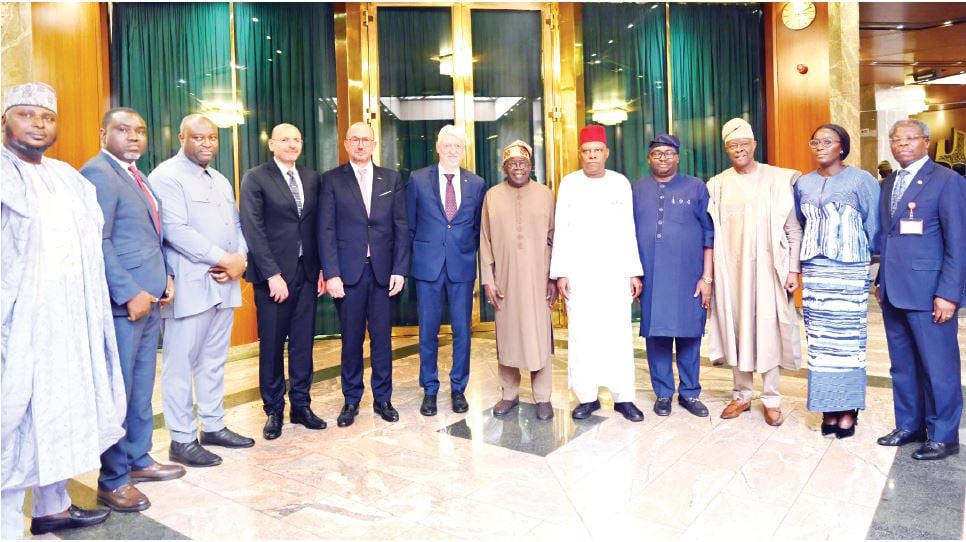President Bola Ahmed Tinubu has reaffirmed his administration’s full commitment to improving electricity supply in Nigeria through the Presidential Power Initiative being executed in partnership with Siemens Energy.
Speaking during a meeting with a delegation from Siemens Energy at the State House in Abuja on Monday, Tinubu said the government remained determined to complete the project as part of efforts to expand the nation’s power generation capacity and improve citizens’ living standards.
The meeting was attended by Vice President Kashim Shettima, the Coordinating Minister of the Economy, Mr Wale Edun, the Minister of Power, Mr Adebayo Adelabu, and the Special Adviser to the President on Energy, Mrs Olu Verheijen. The Siemens Energy team was led by Mr Dietmar Siersdorfer, Managing Director for the Middle East and Africa.
According to a statement issued by the Special Adviser to the President on Information and Strategy, Mr Bayo Onanuga, the project aims to generate an additional 4,000 megawatts of electricity when fully completed. The President emphasised that a stable power sector is critical to driving growth in industries, education, healthcare, and transportation across the country.
“There is no industrial growth or economic development without power,” Tinubu said. “I believe that power is the most significant discovery of humanity in the last 1,000 years. I appreciate the partnership on the initiative. The progress of the project so far is notable, but it is not yet where we want it to be. We appreciate the support and commitment of the German government and Siemens. The investment you are making and your commitment align with the future of this country. Our education, our healthcare, and our transportation all depend on energy, and without power, it is an impossible objective. We are taking it very seriously.”
The President also directed the expansion of some major transformer substations from two to three phases to further boost electricity supply. He assured the Siemens delegation that the government would continue to provide the necessary support and resources to ensure the project’s timely completion.
“We are all inspired and happy,” he said. “This is what we want to achieve on the continent. We want everyone to see the glory of our economic recovery and the banishment of poverty.”
In his remarks, the Minister of Power, Mr Adebayo Adelabu, said the sector had recorded major reforms under Tinubu’s administration, including the decentralisation and liberalisation of the electricity market through the signing of the Electricity Act 2023 and the development of a National Integrated Electricity Policy. He noted that these policies had attracted more than $2bn in new investments.
Adelabu explained that the Presidential Power Initiative had achieved significant progress since the Accelerated Agreement was signed at COP28 in Dubai in December 2023, which was attended by Tinubu and German Chancellor Olaf Scholz. He said under the pilot phase, known as Phase Zero, Siemens Energy had successfully delivered and commissioned 10 units of 132/33kV mobile substations, three units of 75/100MVA transformers, and seven units of 60/66MVA transformers across key locations, adding a total of 984 megawatts of transmission capacity to the national grid.
He further revealed that in December 2024, the Federal Executive Council approved the start of the Engineering, Procurement, and Construction contract for Phase One, Batch One, covering substations in Abeokuta, Offa, Ayede-Ibadan, Sokoto, and Onitsha. He added that mobilisation for civil works had been finalised and manufacturing of necessary equipment was ongoing.
“Two of the five substations are targeted for completion by the end of 2026,” Adelabu said. “As we consolidate the gains from the pilot phase and Phase One-Batch One, we are preparing for Phase One-Batch Two, which includes six Brownfield and ten Greenfield substations that will collectively deliver 4,104 megawatts.”
The Coordinating Minister of the Economy, Wale Edun, said the completion of the project would enhance Nigeria’s ease of doing business, create more jobs for young people, and help reduce poverty.
On his part, Siemens Energy’s Managing Director for the Middle East and Africa, Mr Dietmar Siersdorfer, said the company was committed to completing two of the five Batch One substations by December 2026. He disclosed that Siemens was also building a training centre to develop local electrical engineers and transfer technical knowledge to Nigerians.
“The PPI is not just a project but a platform for long-term development and prosperity,” he said. “Nigerian professionals will be directly engaged at the project sites, while thousands of indirect jobs will be created in the surrounding communities through services, accommodation, and transportation.”
A representative of the German Ambassador to Nigeria, Mr Johannes Lehne, assured Tinubu of Germany’s continuous partnership and support in ensuring the success of the project.
The Presidential Power Initiative, launched in 2019, aims to modernise Nigeria’s electricity infrastructure, expand transmission capacity, and ensure reliable power supply to households and industries across the country.
